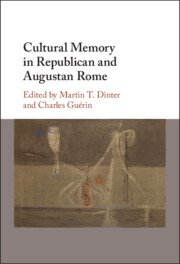Book contents
- Cultural Memory in Republican and Augustan Rome
- Cultural Memory in Republican and Augustan Rome
- Copyright page
- Contents
- Figures
- Contributors
- Acknowledgements
- Chapter 1 Introduction: What is Cultural Memory?
- Part I Writing Cultural Memory
- Part II Politicising Cultural Memory
- Part III Building Cultural Memory
- Part IV Locating Cultural Memory
- Chapter 19 Exchanging Memories: Coins, Conquest, and Resistance in Roman Iberia
- Chapter 20 Cicero and Clodius Together: The Porta Romana Inscriptions of Roman Ostia As Cultural Memory
- Chapter 21 Augustan Cultural Memories in Roman Athens
- Chapter 22 Different Pasts: Using and Constructing Memory in Augustan Carthage and Corinth
- Bibliography
- Index Locorum
- Index
Chapter 20 - Cicero and Clodius Together: The Porta Romana Inscriptions of Roman Ostia As Cultural Memory
from Part IV - Locating Cultural Memory
Published online by Cambridge University Press: 27 April 2023
- Cultural Memory in Republican and Augustan Rome
- Cultural Memory in Republican and Augustan Rome
- Copyright page
- Contents
- Figures
- Contributors
- Acknowledgements
- Chapter 1 Introduction: What is Cultural Memory?
- Part I Writing Cultural Memory
- Part II Politicising Cultural Memory
- Part III Building Cultural Memory
- Part IV Locating Cultural Memory
- Chapter 19 Exchanging Memories: Coins, Conquest, and Resistance in Roman Iberia
- Chapter 20 Cicero and Clodius Together: The Porta Romana Inscriptions of Roman Ostia As Cultural Memory
- Chapter 21 Augustan Cultural Memories in Roman Athens
- Chapter 22 Different Pasts: Using and Constructing Memory in Augustan Carthage and Corinth
- Bibliography
- Index Locorum
- Index
Summary
At the mouth of the Tiber river lies Ostia, Rome’s port town. Legend has it that Ostia was founded as Rome’s first citizen colony (a colonia civium Romanorum) back in the 600s BC, but the archaeological evidence dates the first structured settlement, which was protected by a wall of tufa blocks, to the 300s BC.1
Soon the settlement outgrew the small castrum (as the area surrounded by the early wall is called today) and both private and public buildings spread out in every direction. The Roman Late Republic (c. 133–31 BC) brought hardship on several occasions. During the first four decades of the last century BC, the inhabitants of Ostia suffered both from troops involved in civil warfare and from a raid by daring pirates from the eastern Mediterranean.2 The town was unable to protect itself adequately, since it lacked a proper town wall.
Keywords
- Type
- Chapter
- Information
- Cultural Memory in Republican and Augustan Rome , pp. 355 - 374Publisher: Cambridge University PressPrint publication year: 2023

